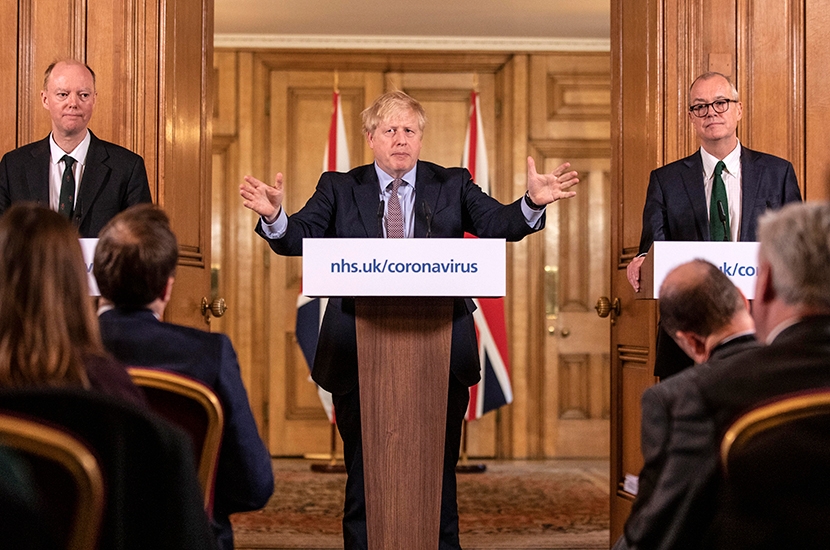From the outset of the Covid-19 crisis, the government was determined that scientists would play a central and highly visible role. The Prime Minister set the tone in his first daily press briefing, when he addressed the nation flanked by the chief medical officer and the chief scientific adviser. The message was clear: this was a government that cherished, not rejected, experts. They were not going to be kept in a back room, but would be there to explain the reasoning behind all policy-making.
But this new relationship between government and scientific establishment risks going sour. Professor Neil Ferguson of Imperial College advised the government that Covid-19, if left unconfronted, could take 500,000 lives: almost as many as are killed each year by all other causes put together. Lockdown, he said, would limit this to about 20,000. Ministers started to publish charts comparing the UK favourably with other nations. They stopped doing this when it became clear Britain had somehow ended up with more Covid deaths than any other European country.
What went wrong? It’s not so much that Professor Ferguson’s advice was incorrect: it almost certainly was, but everyone, in the early stages, was simply making their best guess. Chris Whitty, the chief medical officer, would regularly remind us of how little we knew for sure. Ministers kept repeating that they were following ‘the best scientific advice’ — yet that advice, mysteriously, was usually kept confidential, perhaps because it simply laid out options and emphasised how little certainty there actually was. Scientists stressed that decisions lie with politicians, who must also gauge the effects of non-scientific issues such as school closures, economic hardship and lives damaged by both lockdown and the virus.
The idea of relying on the certainty of experts is a problem that did not begin with this government
Sir Adrian Smith, president elect of the Royal Society, summed up his colleagues’ frustration this week. He said: ‘The danger is if the politicians keep saying, “We’re simply doing what the scientists tell us.” That could be awkward. Politicians ultimately must make the decisions.’ He is right: advisers advise and ministers decide. It is what we pay them for. They should not be hiding behind advice they receive, whether it be from a paid scientific adviser or a doorman at No. 10. If this advice is not published, we end up with a form of black-box democracy, where decisions are taken based on advice that is never shared or scrutinised. Such an approach is a recipe for bad decisions.
Even testing is bringing its problems. Enquiries by The Spectator have established that tens of thousands of patients who took a test have been told the result was void. There are concerns that the real number of wrong results could run into the hundreds of thousands: cases where the test failed, but patients were told that it worked. Lawrence Young, professor of molecular oncology at Warwick — who helps run government testing — fears that as many as a third of people who have Covid-19 could wrongly be given the all-clear.
The idea of relying on the certainty of experts is a problem that did not begin with the current government. Gordon Brown, who this week joined the attacks over the failure to test more people, was himself all too easily persuaded by the contents of the dossier on Saddam Hussein’s weapons of mass destruction and intelligence that was not as emphatic as Tony Blair’s government made out.
If any scientist advised the government that there was no need to worry about the infection spreading in care homes, that advice should have been overridden by common sense. The practice of discharging hospital patients to care homes, without even a test to see if they were carrying the virus, could turn out to be the biggest scandal of this crisis. It will be for the inevitable inquiry to find out who made that recommendation.
Labour, under its new leader Keir Starmer, has sensed the government’s vulnerabilities on some of these issues, but the party has hardly inspired confidence in its own approach. It tried to make a scandal out of the attendance of the PM’s chief adviser, Dominic Cummings, at meetings of Sage, the scientific advisory committee. But it is perfectly reasonable for a government adviser to seek to understand how the committee makes its decisions. The real problem regarding Sage is that it is expected to come up with a consensus of opinion, where none exists.
It would have been far more productive if cabinet ministers had quizzed members of Sage individually, and thereby understood just how divided the scientific world has been, and why. The more uncertain the subject, the more widely the government needs to seek advice, and ideally that advice should be published and debated in parliament.
If serious errors have been made on the part of the government, many will be excusable on the grounds that no one really understood what the world was facing back in January and February. Some, such as the neglect of care home residents, will be less so. But what matters most of all will be what we learn from the experience. One thing is for sure: no one in government should even consider blaming the scientists.
An earlier version of this article stated that 8 per cent of tests had come back as void, and that this amounted to 220,000 tests. After publication, the Department of Health and Social Care said the figure applied to only part of the testing regime and that the proper figure is 91,000 void tests for pillar two of the strategy. We are happy to make this correction.






Comments